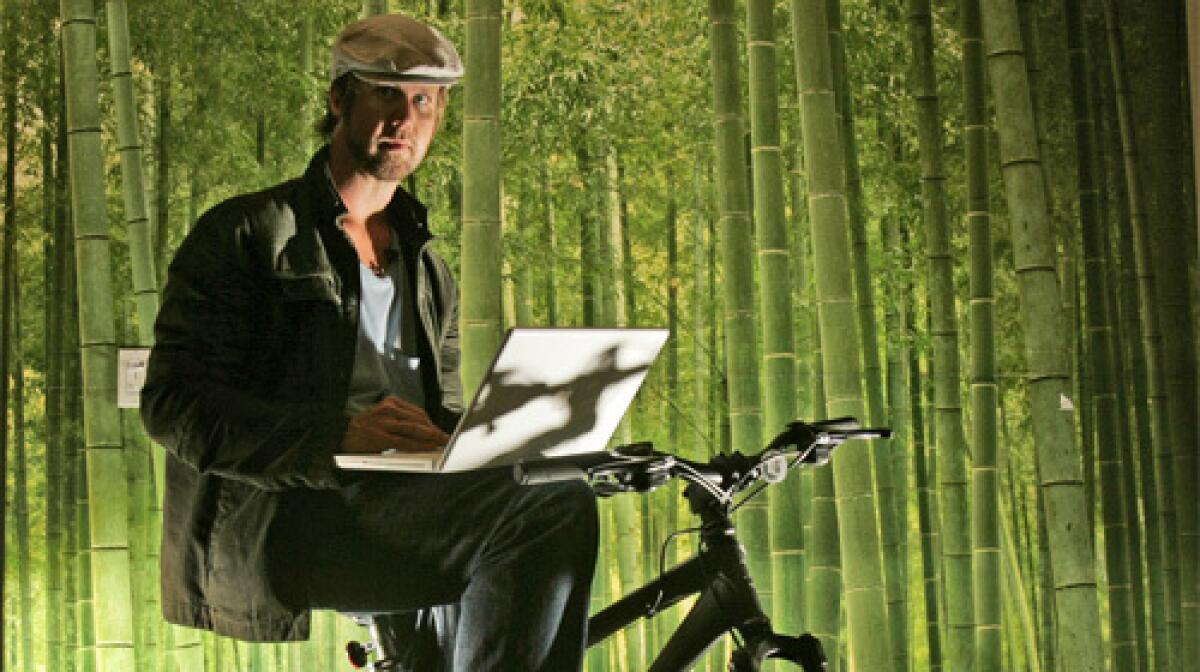Ad exec has flair for pushing green

- Share via
Eric Ritz has a big meeting with executives at an action sports network, and he’s all dressed up: His plaid shirt isn’t tucked into his jeans, his dirty-blond hair pokes out from under his cap and most grandmothers would say he needs a shave.
The Fuel TV executives Ritz is meeting with aren’t fazed. They’re looking for someone who can help them both go green and appeal to the youth market. And Ritz, a 35-year-old former advertising executive, is someone with the kind of track record that gets attention.
At the Coachella Music Festival, Ritz is the guy who brought the popular Jiffy Pop “tree,” which sports branches adorned with packages of the iconic treat and an environmentally friendly ethanol-powered hibachi grill for cooking them.
At dozens of other events, he has set up attention-grabbing bits of environmental performance art, including a green-themed chess game with human pieces and bicycle-powered cellphone charging stations.
“He’s reaching an audience that’s pretty cynical and he’s pretty successful at it,” said Jake Money, a marketing executive at Fuel TV, News Corp.’s action-sports cable network.
Corporate America has gone green, or at least wants to tell its customers that it has. Companies spend more than $1 billion a year on cause-related marketing, according to market research firm Mintel International Group Ltd., with a growing portion of that going for green-related issues.
That means new consulting gigs for market strategists and some of the big environmental groups, and a living, albeit a sparse one, for activists such as Ritz.
Six years ago, Ritz quit his career as an advertising and marketing executive to start Global Inheritance, which he bankrolled with $80,000 in savings.
The group sustains itself through consulting fees from the companies it advises, including Walt Disney Co.’s ESPN, Anschutz Co.’s AEG entertainment arm, Virgin Music and Netflix Inc.
Ritz says he works with these companies not for their big bucks but for the access to their audiences. He doesn’t draw a salary but reimbursed himself for $25,000 in operating expenses last year, according to federal tax documents. Ritz said the money helps cover the rent on the group’s downtown Los Angeles warehouse office space, travel expenses and the like.
He’s assisted by a loose confederation of artsy volunteers and interns, two of whom recently became the group’s first paid staffers.
“People are inspired by his creativity and his passion,” said Sarah van Schagen, one of Global Inheritance’s volunteers, whose day job is assistant editor at the environmental news site Grist.org. “He’s also just a likable person.”
What makes Ritz’s brand of activism different -- and what fuels his efforts -- is that unlike earlier generations of social advocates, Ritz said he and his Generation Y audience don’t see big business as the enemy.
“You have to work within the system to have the most impact,” Ritz said. “Nobody owns us, but we work with partners to reach as many people as possible -- that’s the goal. We’re leveraging their audience.”
Back at his meeting with Fuel TV, Ritz was ready with a slew of ways to give a green tint to Swerve, Fuel’s first film, art and music festival that was held last fall at Hollywood’s Barnsdall Art Park:
What about a giant track for radio-controlled cars run on energy-efficient fuel cells? Bicycles that recharge cellphones? An arm-wrestling match between people dressed as oil derricks and windmills?
At the end of the Swerve Festival meeting, Ritz leaves with approvals for, among other things, an installation of artist-decorated recycling bins and bicycle-powered charging stations, one of which will also rotate a disco ball, because the shimmering lights are way cool.
“He’s a solution-based realist,” said Chris Stiepock of ESPN and the general manager of the X Games, which for the last several years has hired Ritz to help with its recycling program and other initiatives.
Ritz, who has the scruffy all-American looks of Owen Wilson, said he views groups that lean too far one way or another as ineffective or impractical.
“They’re either so corporate watered-down that they’re uninspired, or they go over the top and you can smell the cheap weed and Hacky Sacks a mile away.”
Ritz aims to be neither.
He isn’t the only environmentalist who has decided to join ‘em rather than beat ‘em. But he’s one of the few to take the plunge and retain his green credibility.
“Eric is the real deal,” said Kelly Cox, who runs the Natural Resources Defense Council’s youth program, ItsYourNature.org, one of several environmentalists who have vouched for Ritz’s environmental integrity. “He does work with corporations, but he’s very smart about how he goes about that.”
Like everything else about Global Inheritance, its office inside a downtown Los Angeles warehouse is uber hip and ultra economical. The office is subdivided into cubicles by rows of wood, glass and corrugated metal sheds.
The two paid staffers Ritz finally could afford to hire last summer toil on their own laptop computers inside the group’s 150-square-foot space.
One wards off a draft with a UPS shipping blanket. Neither looks up when, every few minutes, a truck rumbles by outside, rattling the large metal roll-up doors at the front of the building.
With the music from a nearby underground radio station providing background tunes, the trio thinks up their next bits of political theater and rallies the group’s members.
About 20,000 people have signed up to receive information about Global Inheritance projects. A nexus of 50 to 60 hard-core volunteers stand ready to travel across the country with Ritz to camp out at festivals or stay in cheap motels outside big events.
That bunch builds Ritz’s visions, staffs the information tables, provides logistical and setup help and works the Global Inheritance “exhibits.”
Ritz makes it clear that Global Inheritance doesn’t require being a vegan (Ritz isn’t). It doesn’t mean driving a hybrid car (Ritz can’t afford one). And it isn’t lecturing or preaching to those who don’t live the stereotypical green lifestyle.
“We want it to be accessible,” Ritz said. “We accept everybody for who they are, not relying on stereotypes to judge people or judge issues.”
At the Swerve Festival, 10-year-old Otis Kind stopped to see a Global Inheritance recycling bin painted with an oil-derrick-eating Tyrannosaurus rex. He then slid over to the group’s nearby table in search of stickers to decorate his skateboard.
When Ritz told him the price of the sticker was one recyclable bottle or can, Otis ran off to a nearby trash pail to see if he could find any improperly disposed of plastic or aluminum -- exactly the response Ritz hoped for.
The exchange program, which Ritz dubbed the TRASHed Recycling Store, has been one of Global Inheritance’s most successful programs at X Games, Coachella and a host of other venues.
Global Inheritance was born in 2002 after Ritz expanded from producing socially conscious T-shirts to decorating recycling bins. In a bid to get the receptacles noticed, Ritz encouraged his coterie of artists, musicians, extreme sports athletes and celebrities such as Hunter S. Thompson to redesign bins in wild and unexpected ways.
Not all of Ritz’s ideas work out so well.
The producers of the Honda Civic Tour, which is considering bringing Ritz on to help with next year’s music program, already let him know that a popular Global Inheritance program called Tour Riders wouldn’t be a good fit.
That initiative gives prizes and preferences to attendees who take public transportation -- not the most logical program for a car company.
Global Inheritance’s annual operating budget this year will run about $200,000, Ritz said. But Ritz has to think about that question and then guess, because most of the group’s revenue goes right back into its programs.
For example, the group got $20,000 from Virgin to put on a life-size “Causes versus Cures” chess game at the Virgin Festival music event in Toronto. Human volunteers were outfitted to look like “causes,” such as an oil derrick and a piece of coal, and “cures” including a windmill and a solar panel.
Still, Ritz isn’t ready to make money if it means watering down his message or partnering with businesses he deems unworthy.
He has turned down some big checks. He declined a television show invitation to bring in his alternative-power bikes and be filmed as they helped power the studio’s operations.
“We’re not about being some sort of disguise for a corporation doing bad things,” he said. “It’s more about helping the society than helping the corporation.”
With that, Ritz turns back to his next big idea -- desert golf.
“Turn the sprinklers off and thinking cap on as you play virtual golf in the sand, rock and brush to discover the challenges of the global water crisis,” he said.
Ritz already has volunteers signed up to help -- and corporate partners too, of course.
More to Read
Inside the business of entertainment
The Wide Shot brings you news, analysis and insights on everything from streaming wars to production — and what it all means for the future.
You may occasionally receive promotional content from the Los Angeles Times.










